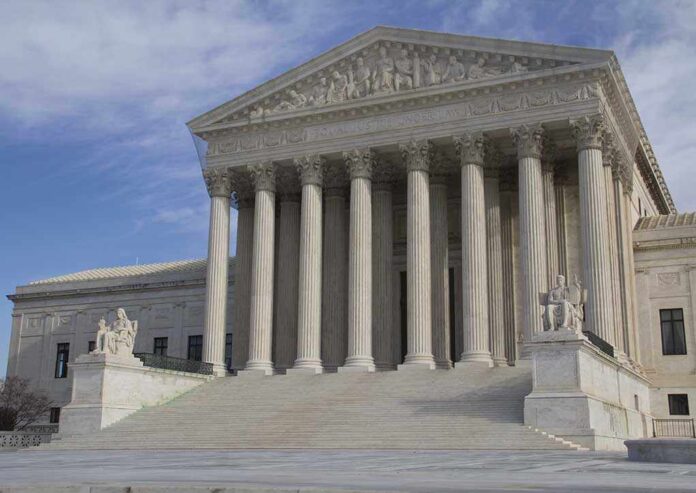The Supreme Court has agreed to hear a monumental case that could determine whether millions of Americans who use marijuana—even in states where it’s legal—can exercise their Second Amendment rights, marking a critical test of constitutional gun ownership protections under the Trump administration.
Key Points
- Supreme Court will review a federal law banning drug users from owning firearms, with arguments expected in early 2026
- The case challenges a 1968 prohibition affecting millions of Americans, including those using state-legal marijuana
- Lower courts split on constitutionality after the Supreme Court’s 2022 Bruen decision expanded Second Amendment protections
- Outcome could set precedent for future challenges to federal gun restrictions and redefine the balance between individual rights and government overreach
Federal Gun Ban Faces Constitutional Challenge
The Supreme Court’s decision to review the constitutionality of a federal law prohibiting unlawful drug users from possessing firearms represents a pivotal moment for Second Amendment advocates. The case centers on Ali Danial Hemani, a Texas man indicted for possessing a firearm while allegedly using marijuana and cocaine. This prohibition stems from the 1968 Gun Control Act, which categorized drug users alongside felons and fugitives as individuals deemed too dangerous to own firearms. The 5th Circuit Court of Appeals ruled this blanket ban unconstitutional in 2024, creating a circuit split that demanded Supreme Court intervention.
Bruen Decision Creates New Legal Landscape
The Supreme Court’s landmark 2022 ruling in New York State Rifle & Pistol Association v. Bruen fundamentally changed how gun laws are evaluated, establishing that firearms restrictions must align with America’s historical tradition of regulation. This standard has empowered constitutional challenges to longstanding federal prohibitions that previously went unquestioned. The drug-user ban now faces scrutiny under this framework, with gun rights advocates arguing that the government cannot justify stripping Americans of constitutional protections based on past or occasional drug use without clear historical precedent supporting such broad disarmament.
State-Federal Conflict Over Marijuana Intensifies
The case highlights a glaring contradiction: marijuana is legal for recreational use in approximately half of U.S. states, yet remains federally prohibited. This creates an untenable situation where law-abiding citizens in states like Colorado or California face federal felony charges for exercising Second Amendment rights while using a substance their state government has legalized. The federal government’s continued classification of marijuana as illegal demonstrates the kind of overreach that frustrates Americans who believe states should determine their own policies without federal interference threatening constitutional rights.
Implications for Gun Rights and Government Power
DOJ officials defend the prohibition by claiming drug users pose unique dangers and that the restriction is temporary—ending when drug use stops. However, this argument fails to address the reality that millions of Americans could lose fundamental constitutional rights based on conduct that poses no demonstrable threat to public safety. Gun rights advocates emphasize that the law criminalizes past behavior without requiring proof of current impairment or dangerousness, representing exactly the kind of preemptive government control that the Founders warned against when drafting the Second Amendment.
Broader Constitutional Questions at Stake
Legal scholars recognize this case could reshape federal gun regulation beyond drug users, potentially affecting other “prohibited persons” categories that restrict firearm ownership. The Trump administration’s DOJ continues defending the law, but the Supreme Court’s decision—expected by summer 2026—will determine whether expansive federal prohibitions can survive constitutional scrutiny under the Bruen standard. This represents a critical juncture for individual liberty: will the Court prioritize Americans’ constitutional rights, or will it allow the federal government to maintain sweeping restrictions that disarm citizens based on behavior the government disapproves of, regardless of actual danger or state-level legalization?
Sources:
Supreme Court to decide constitutionality of law barring gun ownership for drug users – CBS News
Supreme Court to Rule on Constitutionality of Drug User Gun Ban – Bloomberg
Supreme Court will decide on guns rights for drug users – LA Times
Supreme Court will consider whether people who regularly smoke pot can legally own guns – ABC News











